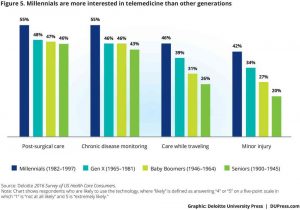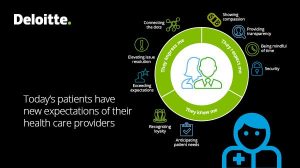
Consumers are open to technology-enabled healthcare, but look to providers to ensure quality and privacy of patients’ personal health information, according to Will Patients and Caregivers Embrace Tech-Enabled Healthcare?, based on the Deloitte 2016 Survey of US Health Care Consumers.
Seven in 10 consumers would use at least one of the technologies Deloitte served up in its study, with telemedicine at the top of the list: 49% of people favor telemedicine for post-surgical care, 48% for chronic disease management, 36% for care while traveling, and 32% for minor health issues. While Millennials are generally keener across-the-board for tech-enabled health care, it’s important to note that nearly one-half of Boomers and Seniors favor telemedicine for post-surgical care and chronic disease management — two issues for which older people are more at-risk.
And heads-up to health care providers who don’t provide telemedicine access to patients: 63% of consumers likely to use telemedicine said they’d try another provider who did, to save money (43%) or time (35%).
The key concerns about using a technology like telemedicine for personal health care are quality and data security of “my” personal health information. Deloitte recommends that health care providers educate consumers on the merits of the technology, provide a seamless connected experience, and be clear about the security of the connection and the data transmission. Doing these things would bolster trust and nurture shared decision-making between patient and provider.
 Health Populi’s Hot Points: We’d still rather use technology for shopping, banking, doing taxes, and managing finances than to manage our health, Deloitte found. Among the tech-enabled actions consumers are taking on behalf of their own health are electronically refilling prescriptions (58%), tracking fitness and wellness metrics (32%), paying medical bills online (31%), and monitoring health issues like blood glucose and blood pressure (24%).
Health Populi’s Hot Points: We’d still rather use technology for shopping, banking, doing taxes, and managing finances than to manage our health, Deloitte found. Among the tech-enabled actions consumers are taking on behalf of their own health are electronically refilling prescriptions (58%), tracking fitness and wellness metrics (32%), paying medical bills online (31%), and monitoring health issues like blood glucose and blood pressure (24%).
While more patients are facing growing out-of-pocket health care costs via deductibles and copayments, only 18% of consumers have checked on the costs of care using an online cost-tracking tool provided by a health insurer.
Furthermore prescription drug tools aren’t yet well-used, with 17% of consumers receiving medication reminders and 15% measuring or transmitting data about medications they’re taking.
Healthcare, we have a design problem, and it starts with appreciating the fact that patients are now health consumers expecting a retail-style experience. Check out Deloitte’s infographic here, noting that “today’s patients have new experiences of their health care providers.” For more on that retail-level expectation among health care consumers, see my recent post on consumers’ growing use of retail health “doors.”





 I'm in amazing company here with other #digitalhealth innovators, thinkers and doers. Thank you to Cristian Cortez Fernandez and Zallud for this recognition; I'm grateful.
I'm in amazing company here with other #digitalhealth innovators, thinkers and doers. Thank you to Cristian Cortez Fernandez and Zallud for this recognition; I'm grateful. Jane was named as a member of the AHIP 2024 Advisory Board, joining some valued colleagues to prepare for the challenges and opportunities facing health plans, systems, and other industry stakeholders.
Jane was named as a member of the AHIP 2024 Advisory Board, joining some valued colleagues to prepare for the challenges and opportunities facing health plans, systems, and other industry stakeholders.  Join Jane at AHIP's annual meeting in Las Vegas: I'll be speaking, moderating a panel, and providing thought leadership on health consumers and bolstering equity, empowerment, and self-care.
Join Jane at AHIP's annual meeting in Las Vegas: I'll be speaking, moderating a panel, and providing thought leadership on health consumers and bolstering equity, empowerment, and self-care.